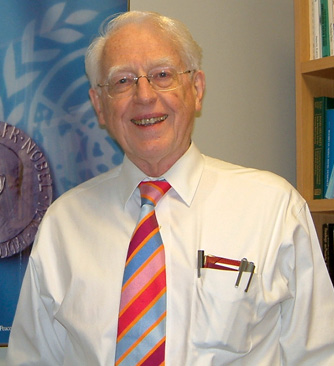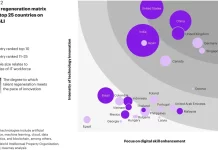In May 2012, a distinguished group of international economists and social scientists published Be Outraged: There Are Alternatives, an impassioned critique of austerity economics. The authors argued that austerity is bad economics, bad arithmetic, and ignores the lessons of history.
One of the outraged academics was Sir Richard Jolly. Now in his eighties, the economist has been a leading figure in international development since the 1970s, notably within the United Nations. Sir Richard Jolly is credited with introducing the concept of human development to the organisation. He is still going strong and full of energy, ideas, and enthusiasm for redistributing wealth and making the world a better place.
In 2015, the UN introduced the sustainable development goals (SDGs), replacing the millennium development goals (MDGs) and setting out the world’s most pressing issues. Sir Richard says of the new goals: “The SDGs are universal, which is a major advance. Instead of the north speaking to the south, we’re now really recognising that all countries need to take action for all peoples. The SDGs are integrating sustainability and climate change. That is a fundamental and important shift from the MDGs.”
Sir Richard has a detailed first-hand understanding of the development agenda. A former assistant secretary-general holding senior positions at the UN Children’s Fund (UNICEF) and the UN Development Programme (UNDP), he was the architect of the widely celebrated Human Development Report as well as the author of some twenty books spanning everything from the UN’s history to the resilient successes of UN ideas.
An underlying theme in his work has been putting people first. His philosophy of development may be characterised by replacing the neo-liberal paradigm with one centred on human development. He says that while the economy is important, it constitutes merely a means to an end.
Economic development can sometimes lead to greater inequality and fewer opportunities for people to live well. Investment in health and education matters not only because they make the workforce more productive but because a healthy life and the pursuit of knowledge are part of what it means to live well as human beings. Poverty is not just a matter of income: it is also a lack of voice, access to knowledge and healthcare, and dignified employment.
Sir Richard believes human development needs to prioritise the concern for people and their well-being at all levels – individual, organisational, or governmental.

The Making of an Architect
Sir Richard Jolly grew up in Hove, a coastal town in south east England. His parents were both involved in local community service and keen members of the local Presbyterian Church. Sir Richard says he absorbed a sense of service during his childhood. He was one of around 16,000 young Britons evacuated to North America for the duration of the Second World War, returning home in May 1945.
In 1954, he went to Cambridge University to study Economics and was active in college Christian societies. He read widely and became a pacifist. Faced with call-up for national service, he registered as a conscientious objector. The court allowed him to do voluntary work in Kenya instead. This African experience changed his views. The Christian missions he encountered were run by evangelical fundamentalists. Seeing them at work in a totally different cultural environment led Sir Richard to question his faith. Before long, he turned away from religion. However, the two years in Kenya left him fascinated by development and committed to the fight against inequality. In 1959, Sir Richard abandoned his plan to attend Harvard Business School, opting instead to study development at Yale University where he was awarded a doctorate.
In 1963, he was back in Africa working as a research fellow at the East Africa Institute of Social Research. He became an adviser to the Government of Zambia on human resources management. The following year, Sir Richard secured a position as a research officer in Applied Economics at Cambridge University.
In 1969, he was appointed a fellow at the then recently opened Institute of Development Studies (IDS) at Sussex University. Thus began a connection that was to last nearly half a century. In the heady days of the late 1960s, IDS was not a typical research institute: it tried to put its egalitarian philosophy into practice.
For example, IDS had an internal income tax that required that confiscated half of anyone’s earnings from consultancy work. Decisions on how this money should be used were made by popular vote every year. Porters, kitchen staff, and secretaries were all entitled to participate in the process. The IDS fund was used to give staff – secretaries as well as academics the opportunity to work overseas, experiencing first-hand how Third World institutions operate.
Sir Richard Jolly was director of IDS from 1972 to 1981. From this perch he became involved with multilateral organisations. From 1982 to 1995, he was UNICEF deputy executive director with responsibilities for programmes in over 130 countries, supporting the child survival revolution and strategies of “structural adjustment with a human face” which eventually led to the concept of human development. At UNICEF, Sir Richard was also directly involved in efforts to ensure the needs of children and women were no longer ignored in economic adjustment policies.
Knighthood
From 1996 to 2000, Sir Richard became special adviser to the administrator of the United Nations Development Programme and principal coordinator of the widely-acclaimed Human Development Report. He was made a Knight of the Order of St Michael and St George for his contributions to international development.
Sir Richard has written and co-authored many publications. Whimsically, his first published paper was an empirical study investigating the route taken by Hannibal more than 2,000 years ago. In 218 BC, the Carthaginian general – along with 38,000 infantrymen, 8,000 cavalrymen, and 38 elephants – crossed the Alps between Gaul and Rome during the Second Punic War to lay siege to Rome – a plan met with initial success but that ultimately failed and left him stranded in Southern Italy.
Sir Richard was one of a group of nine friends who, accompanied by an elephant dismissed from circus duties, successfully retraced Hannibal’s transalpine trek in 1959.
































